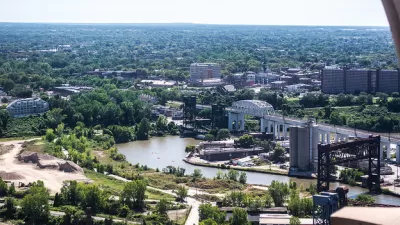For many years, economists have touted the higher-education and health care sectors as powerful engines for local economic growth. However, a growing chorus of observers are warning about the continued validity of that premise.
"The reasons many cities turn to eds and meds for economic development are easy to understand," observes Richard Florida. "Both industries have been defined by substantial growth over the past few decades, and that looks set to continue." However changes are afoot in those industries that will likely result in a "greater concentration of the education and medicine sectors in fewer cities and regions."
Florida and his colleagues dig into employment data to determine which local economies are most at risk by such consolidation. Their analysis reveals that small cities like Goldsboro and Greenville in North Carolina; Johnson City, Tennessee; and Rome, Georgia might want to diversify their economies.
And, as he notes, this might not necessarily be a bad thing. Analysis by his colleague Charlotta Mellander indicates that "[e]ds and meds employment levels were uniformly negatively associated with nearly every single important measure of regional economic performance: income, economic output per capita, and high tech industry concentration."
FULL STORY: Where 'Eds and Meds' Industries Could Become a Liability

Alabama: Trump Terminates Settlements for Black Communities Harmed By Raw Sewage
Trump deemed the landmark civil rights agreement “illegal DEI and environmental justice policy.”

Planetizen Federal Action Tracker
A weekly monitor of how Trump’s orders and actions are impacting planners and planning in America.

The 120 Year Old Tiny Home Villages That Sheltered San Francisco’s Earthquake Refugees
More than a century ago, San Francisco mobilized to house thousands of residents displaced by the 1906 earthquake. Could their strategy offer a model for the present?

Rural Missouri Transit Service Could Lose State Funding
OATS Transit offers low-cost rides to primarily elderly rural residents with little or no access to other transportation options.

Opinion: California’s SB 79 Would Improve Housing Affordability and Transit Access
A proposed bill would legalize transit-oriented development statewide.

Record Temperatures Prompt Push for Environmental Justice Bills
Nevada legislators are proposing laws that would mandate heat mitigation measures to protect residents from the impacts of extreme heat.
Urban Design for Planners 1: Software Tools
This six-course series explores essential urban design concepts using open source software and equips planners with the tools they need to participate fully in the urban design process.
Planning for Universal Design
Learn the tools for implementing Universal Design in planning regulations.
Clanton & Associates, Inc.
Jessamine County Fiscal Court
Institute for Housing and Urban Development Studies (IHS)
City of Grandview
Harvard GSD Executive Education
Toledo-Lucas County Plan Commissions
Salt Lake City
NYU Wagner Graduate School of Public Service





























